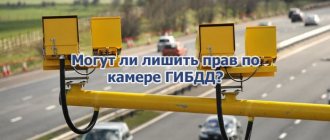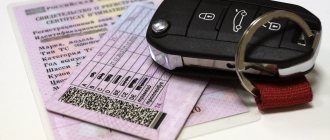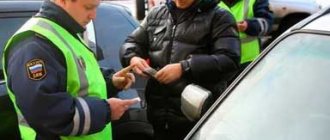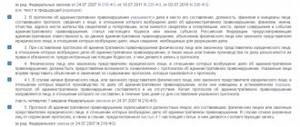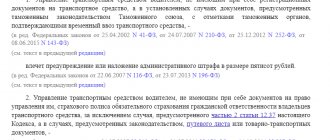Clarifications of the Supreme Court
In order to protect drivers, judicial practice in 2021 focused the attention of traffic police inspectors on the correctness of drawing up protocols. In particular, it was pointed out that mistakes should not be made. And this is fair, since the protocol on the deprivation of a driver’s license is important evidence in a particular case.
Thus, in 2021, the Supreme Court, represented by Judge Sergei Nikiforov, sided with a Moscow driver who was fined 1,500 rubles and deprived of his driver’s license for refusing to undergo a medical examination. The driver did not agree with the punishment and went all the way to the Supreme Court.
And here are the violations identified by the judge of the Supreme Court of the Russian Federation:
- Different times in the protocols (40 minutes difference).
- The traffic police inspector did not explain to the driver his rights and obligations (there was no signature or receipt).
- The witnesses also did not receive any explanations (there were also no signatures).
- Finally, the secretary of the magistrate’s court did not take care to properly notify the driver about the place and time of the consideration of the case (the electronic request in the system was in the “processing” status, and the driver did not receive registered letters).
And what's the result? The court found too many significant errors, including in the preparation of the protocol. As a result, the decisions of the lower courts were overturned, and the administrative prosecution of the driver was terminated due to the lack of proof of the circumstances. Well, of course, they returned the license and the fine paid.
As you can see, the Supreme Court of the Russian Federation competently examined the case and identified serious violations that played in favor of the driver. But, unfortunately, in 2021, magistrates often turn a blind eye to errors in traffic police protocols. As a result, the case is considered immediately, and the arguments of motorists and their defenders are not taken into account. The last one has to go to the very end, involving the Supreme Court of the Russian Federation.
Below we will consider which mistakes can lead to the collapse of a case in court, and which should not be taken seriously.
The court will not deprive your license if the inspector corrected the protocol without the driver’s knowledge
The court returns the drivers' licenses due to mistakes made by inspectors when making changes to procedural documents. The Supreme Court, when considering cases of administrative offenses, has repeatedly explained that a traffic police officer does not have the right to independently, namely unilaterally, correct procedural documents such as protocols, acts and others, but the number of complaints about such violations does not decrease.For example, in April of this year, citizen Z. was deprived of his rights for 1 year 6 months for refusing to undergo a medical examination for intoxication (Article 12.26 of the Administrative Code). At the same time, in the protocol on sending him for a medical examination, “I agree” was initially written, but the inspector added the “no” part there already at the department. Thus, according to what was originally in the protocol, driver Z. did not commit the alleged offense, and the “amendments” made indicate the opposite. In the protocol on the suspension of an employee from driving, the time for drawing up the protocol was changed, and in the report on the examination for intoxication, “the state of alcohol intoxication was not established” was corrected to “was not carried out due to refusal.” At the same time, there is no information in the case materials that these changes were made to the documents in the presence of citizen Z., or that he even knew about it or could have known. Near the postscripts there are stamps of the traffic police department and “corrected believe”, but there are no signatures of the alleged violator.
In paragraph 4 of the resolution of the Plenum of the Supreme Court “On some issues that arise for courts when applying the Code of Administrative Offenses of the Russian Federation” dated March 24, 2005, it is stated that if a protocol on an administrative offense is drawn up or other materials are drawn up incorrectly, the judge must make a ruling on the return of these documents to the authority or the official who compiled them (clause 4, part 1, article 29.4 of the Administrative Code). Despite this clarification, the magistrate did not return the case to the traffic police to eliminate the contradictions and began to consider it. Five times he called the traffic police inspector to the meeting, who made corrections to the protocols and the act, and when he appeared, he confirmed that Z. did not report changes in the documents, did not call him to the correction procedure and did not send him copies of the procedural acts with amendments . The magistrate and the appellate court considered this situation to be completely legal, citing paragraphs 36 and 37 of the Administrative Regulations of the Ministry of Internal Affairs. The Supreme Court found that the regulations talk about the procedure for making changes to definitions and decisions in a case of an administrative offense, whereas in the case under consideration, changes were made to other documents. Despite the fact that citizen Z. spoke about violations of the Code of Administrative Offenses committed by the traffic police officers and the magistrate in his appeal, the deputy chairman of the district court did not satisfy it, considering the changes made to the documents to be the correction of technical errors. The regional court did not support this position and canceled the previous acts in the case, since they were based on unacceptable evidence, terminated the proceedings in the case and returned the driver’s license.
Alisher T. found himself in a similar situation, who was brought to justice under Part 1 of Art. 12.8 of the Code of Administrative Offenses for driving while intoxicated. He was deprived of his license for one year and eight months and given a fine of 30,000 rubles. At the same time, initially the protocol included Art. 12.26, but that the traffic police inspector independently “reclassified” the violation, citizen T. learned shortly before the court hearing, when he got acquainted with the case materials. The man appealed the decision and the district court overturned it, discontinuing the proceedings due to the lack of corpus delicti (Clause 2, Part 1, Article 24.5 of the Administrative Code). The court again noted that both the case materials and the testimony of the traffic inspector indicate that changes to the protocol were made in violation of the requirements of Art. 28.2 Code of Administrative Offenses (protocol on administrative offence). This “indicates a violation of the procedure for bringing a person against whom proceedings for an administrative offense have been initiated to administrative responsibility and entails a violation of the right of this person to defense,” the court ruling says. Other violations were also found. For example, the inspector sent the driver for a medical examination without any reason.
Driver S. was deprived of his driver's license for one and a half years for refusing to undergo a medical examination for intoxication (Article 12.26 of the Administrative Code). The traffic police inspector drew up protocols against the driver regarding an administrative violation, suspension from driving a vehicle and referral for a medical examination, and then made a number of corrections to them without notifying the driver. “Thus, the person against whom proceedings are being conducted for an administrative offense was deprived of the guarantees provided by law for the protection of his rights, since he could not qualifiedly object and give explanations on the merits of the changes made to the procedural acts,” the court states. The case of citizen S. was before two justices of the peace, each of whom tried to summon the traffic police officer who compiled the protocol to the meeting to receive an explanation, but the inspector never appeared in court. The court considered the amended protocols to be inadmissible evidence in the case, since they were drawn up in violation of the Code of Administrative Offences. And since there is no other evidence in the case confirming that driver S. refused to undergo a medical examination, “conclusions about the presence of an administrative offense in the driver’s actions would be premature,” the court indicated, returning the driver’s license.
Source: Judicial practice.
Is it possible to avoid deprivation of rights if the administrative protocol is drawn up with errors?
Yes, but the violations must be significant. To be even more precise, the error should cast doubt on the very fact of proof of the violation.
Does a mistake in one letter of the surname of the person involved cast doubt? No. Does a mistake in the address cause a violation if a driver is cited for driving into the oncoming lane in violation of traffic rules? Of course, there are already questions about the legality of deprivation of rights.
By the way, errors will be considered by a specific judge in a specific case of deprivation of a driver’s license. The Code of Administrative Offenses of the Russian Federation does not contain any signs of invalidity of the protocol. But we can find the requirements for the content of the document that interests us.
If there is a typo in the last name, first name, patronymic?
This is considered a technical error, and deprivation of rights cannot be avoided.
Example: instead of the surname “Baikov”, the traffic police inspector wrote “Boikov” into the protocol, but the driver did not point out this remark to him. Or didn't notice the typo.
Inaccuracy in the last name, first name or patronymic does not detract from the guilt of the offender. If you ran a red light again, this was recorded by the patrol service registrar, there are witnesses, and a protocol has been drawn up - it is unlikely that deprivation of rights will be avoided solely on the basis of a typo in the last name (first name, patronymic). The judge will either not attach importance to the typo in the full name, or will send the protocol back to the official at the traffic police for correction.
On a note! Theoretically, in the second case, you can count on the expiration of the statute of limitations - in our case, 3 months from the date of drawing up the traffic police protocol (Part 1 of Article 4.5 of the Code of Administrative Offenses of the Russian Federation). If during this time the court does not consider the case and make a decision, then the period for bringing to administrative responsibility will pass. This means production will be stopped. And you will remain with the rights.
Incorrect violation date
Such an error in the protocol on the offense allows the case to fall apart.
For example, you were caught for driving into oncoming traffic on February 16, but the inspector indicated February 15 in the report. It happened that mistakes were made over the years.
There is a serious violation of Part 2 of Art. 28.2 of the Code of Administrative Offenses of the Russian Federation, which states that the protocol must contain “the date of its preparation.” Consequently, if the date in the column is incorrect, then the remaining facts in the protocol do not have a place to be. Perhaps you were abroad or in the hospital that day. This is what you need to build your defense on, pointing out to the court the error with the date - in writing in the form of a petition.
But it just so happens that the judge may consider the wrong date in the protocol to be an insignificant error. The file may also contain other documents (with the correct date) - a medical examination report or a report from a traffic police officer. Then the judge will address them. But he can return the protocol back to the traffic police for correction. And here again it is appropriate to rely on the statute of limitations. That is, delaying the appearance at the traffic police and the court due to notices and calls. 3 months will pass, the statute of limitations will expire, and the proceedings will cease.
Mistake with time
The situation is similar in the case of time.
Let us again turn to the explanations of the Supreme Court from the example at the beginning of the article. Two reports were drawn up against the Moscow driver: one indicated the time of the offense at 2 hours 40 minutes, and the other stated that the same offense was committed at 3 hours 20 minutes. That is, the time difference is 40 minutes. The Supreme Court considered this error to be significant, while lower courts had previously not attached any significance to it.
Conclusion: Draw the court’s attention to discrepancies in the timing of the AP. There is a high probability that the court will find this inaccuracy significant. And the administrative proceedings will be terminated for lack of evidence.
Incorrect address of the crime scene
Again, a lot depends on the judge and the strength of your arguments.
It would seem, what difference does it make, house number 25 or 26? And courts often do not notice addresses entered incorrectly into the protocol. It turns out that the offense was committed in one place, but in fact it is being considered at a completely different address. Perhaps at this very place there is no stop sign, turn, traffic light or other important objects.
What to do in such a situation?
- Attach to the petition the recording from the DVR, any other recording from street cameras, photos and testimony of witnesses.
- Contact the local government authority, prefecture or BTI - you need to get a certificate stating that the address does not exist in principle (if this is indeed the case). You can file a petition with the court to have this information obtained through a judicial request.
It is also important to trace the vehicle's movement pattern on the map. It is better to do this together with the judge in order to identify discrepancies with the data from the protocol directly during the analysis. In the future, this will allow the administrative case to be terminated and the deprivation of rights to be avoided.
No information about witnesses
Witnesses are invited, for example, if you are suspended from driving or are tested for alcohol intoxication. The inspector must find two people, or carry out the procedure on video recording - by virtue of Parts 1-2 of Art. 25.7 Code of Administrative Offenses of the Russian Federation.
At the same time, the traffic police officer must explain to the witnesses the provisions of Art. 25.1 of the Code of Administrative Offenses of the Russian Federation and the provisions of Article 51 of the Constitution of the Russian Federation. If this was not done and these two did not sign the protocols, this indicates procedural violations on the part of the traffic inspectors. Even if witnesses were brought in, but they did not sign, this is also a violation.
Another situation. You have been suspended from driving a vehicle, you are sitting in a patrol car, and the traffic police officer has already filled out a protocol on the suspension. His partner finds two witnesses, they come up and sign the protocol. In fact, this is a violation, since traffic police inspectors must draw up a report in front of witnesses, and not before they are found. And in such cases, you need to apply for the summons of witnesses to the court hearing. When answering the judge’s questions, they will confirm that they signed the already drawn up protocol. And on this basis the case easily falls apart.
The Supreme Court figured out when corrections in the protocol will not save you from punishment
Questions regarding the procedure and grounds for returning administrative material often reach the Supreme Court. The clarifications concern very specific topics that, at first glance, are not very significant, but there is every reason for such close attention, lawyers say. On the one hand, the question is really important: the decision to return documents is of decisive importance for the progress of the case and significantly affects the statute of limitations for bringing to justice, notes Yulia Kurmambaeva, partner at INTELLECT (INTELLECT) INTELLECT (INTELLIGENCE) Federal Rating. group Digital economy group Intellectual property (including disputes) TMT group (telecommunications, media and technology) 13th place By number of lawyers 25th place By revenue per lawyer (more than 30 lawyers) 36th place By revenue Company profile. On the other hand, the meager regulation of procedural issues in the Code of Administrative Offenses simply forces the Supreme Court to constantly eliminate legislative gaps manually.
Once again the issue came to the attention of the court in the case of Igor Svechnikov*. He was brought to administrative responsibility for beatings. The protocol stated that he beat Svetlana Kolobaeva* out of personal hostility. The district court issued a decision to bring Svechnikov to justice, but in the second instance (Kirov Regional Court) the decision was canceled and the proceedings in the case were terminated, concluding that the circumstances of the offense had not been proven. The problem turned out to be in the protocol: the regional court noticed that the district court was returning the protocol dated November 1, 2021 to the compiler to eliminate the shortcomings. And when the corrected protocol was returned, its date did not change, that is, the new document showed the day of its original preparation.
- No protocol - no evidence: what will help cancel the administrative fine
January 16, 17:11
The regional court indicated that eliminating the shortcomings in the protocol on an administrative offense was possible only by drawing up a new protocol with a different date. But the Supreme Court did not agree with this approach. The ruling of Judge Sergei Nikiforov noted that changes to the protocol were made in the presence of Svechnikov, as required by law, as well as witnesses - their signatures are indicated in the document. Svechnikov received a copy of the document. The Supreme Court pointed to paragraph 4 of the Resolution of the Plenum of the Supreme Court No. 5 “On some issues that arise for the courts when applying the Code of Administrative Offences”, according to which “such shortcomings of the protocol are insignificant that can be corrected when considering the case on the merits,” as well as violation of the deadlines for drawing up the protocol about an administrative offense and sending the protocol for consideration to a judge - “these terms are not preemptive.”
“The judge of the regional court, if necessary, was not deprived of the opportunity to independently establish the date of amendments to the protocol on an administrative offense, including through interrogation of the official who compiled it, and to clarify the date of drawing up the document,” the Supreme Court’s ruling says.
The definition also states that the case can be reconsidered if there are new circumstances or during the previous proceedings there was “a significant violation of a fundamental and fundamental nature that affected the outcome of the case.”
“The requirements of legal certainty and stability are not absolute and do not prevent the resumption of proceedings in the case due to the emergence of new or newly discovered circumstances or the discovery of significant violations that were committed at previous stages of the process that influenced the outcome of the case,” from the ruling of the Supreme Court.
This is precisely the violation committed by the regional court. The statute of limitations for bringing Svechnikov to administrative responsibility has not expired, the Supreme Court concluded and returned the case for a new trial to the regional court (No. 10-AD19-4).
Return administrative material: reasons
Conventionally, all grounds for returning administrative material can be divided into two categories. The first is the incompleteness of the presented materials and evidence. There are a lot of options here, since each article of the Code of Administrative Offenses has its own subject of regulation and qualifying criteria, and the materials of administrative proceedings must exhaustively prove all the elements of the offense, says Kurmambaeva. Thus, the basis for a refund is the lack of evidence of the significance of the damage to the customer when brought to justice under Part 7 of Art. 7.32 of the Code of Administrative Offenses (failure to fulfill obligations under a government contract), where this attribute is a qualifying feature. Another example: according to Part 2 of Art. 3.8 of the Administrative Code, an individual can be deprived only of the right that he had at the time of committing the administrative offense. Accordingly, the protocol on the articles of Ch. 12 of the Administrative Code, which provides for the deprivation of a driver’s license, must contain information about the availability of the relevant rights of the person involved. Otherwise, the material will be returned. A private reason for returning the protocol due to incompleteness is also the absence of the person held accountable, when his presence must be ensured by the initiator of the proceedings in accordance with the requirements of Part 3 of Art. 25.1 of the Administrative Code (administrative arrest, administrative detention). Or the lack of evidence that a specific person owns an instrument for committing an offense, when an administrative authority requires the confiscation of this item.
The protocol cannot be corrected: for this the fine will be canceled
The second category of reasons for return is incorrect drawing up of a protocol on an administrative offense and procedural violations. As Alexey Shadrin, lawyer at FBK Law FBK Law Federal Rating, clarifies. group Tax consulting and disputes (Tax consulting) group Tax consulting and disputes (Tax disputes) group Antimonopoly law (including disputes) group Family and inheritance law group Labor and migration law (including disputes) group Pharmaceuticals and healthcare group PPP/Infrastructure projects group Land law/Commercial real estate/Construction group Intellectual property (including disputes) group Corporate law/Mergers and acquisitions group Natural resources/Energy group Private wealth management group Arbitration proceedings (major disputes - high market) group Bankruptcy (including disputes) Company profile, to errors When drawing up a protocol that cannot be corrected, established judicial practice refers to the following situations:
- the officials who drew up the protocol arbitrarily make changes therein without stamps and seals and instructions to “believe the corrected”, and also in the absence of the person in respect of whom such a protocol was drawn up**;
- the protocol does not contain the information specified in Part 2 of Art. 28.2 of the Code of Administrative Offences, if due to its absence or distortion the court cannot establish the factual circumstances of the case, or such information is given distortedly. For example, if the protocol contradicts other procedural documents drawn up. This also includes contradictions in the protocol itself;
- there is no information identifying the person held accountable;
- There is no information about whether the person involved in the case speaks the language in which the proceedings are being conducted, as well as information about the provision of an interpreter when drawing up the protocol. This shortcoming is relevant for protocols drawn up in relation to illegal labor migrants;
- the protocol was drawn up by an unauthorized body (an example was given by Yulia Kurmambaeva).
Minor violations: what are they?
Such shortcomings of the protocol as violation of the deadlines for its preparation and sending for consideration to the judge are considered insignificant, since these deadlines are not preemptive. The date of drawing up a new protocol when it is finalized after the return of the material is also not decisive for the consideration of the case, as the Supreme Court indicated. This circumstance can be clarified when considering the case on its merits.
It is also necessary to remember that the return of administrative material is possible only when preparing a case for judicial consideration and is not allowed when considering a case of an administrative offense on the merits. “If the court that was considering the case missed the inaccuracies in the protocol and accepted it as admissible evidence in the case, then the judge’s mistake is grounds to appeal the judicial act and terminate the proceedings, and, accordingly, exclude administrative liability,” Shadrin clarifies. According to him, in this case it is important that the error made in the protocol regarding the factual circumstances of the case cannot be considered technical. For example, as an obvious typo in surnames, in dates; an error that concerned a violation of the procedure for drawing up the protocol.
* – the names and surnames of the participants in the process have been changed by the editors.
** – Supreme Court Resolution No. 18-AD19-64 dated November 8, 2019.
- Supreme Court of the Russian Federation
Important note!
- This article provides basic information, but each case is different.
- In 92% of all situations there are important nuances that can affect the outcome of the entire case.
- An experienced lawyer will study all the materials of the case and indicate in which direction to move.
Therefore, our website employs on-duty legal consultants who delve into each case and are aimed at solving it.
Ask a Question
or consult toll-free (Moscow), (St. Petersburg), 8 (all of Russia).
If the traffic police inspector did not explain my rights and responsibilities?
An obvious mistake by a traffic police officer who plays in your favor.
Back in 2005, the Supreme Court indicated that the collected evidence should be assessed from the point of view of compliance with the requirements of the law when received (clause 18 of the Resolution of the Plenum of the Supreme Court No. 5 of March 24, 2005). And now, in 2021, this is extremely relevant!
The logic is as follows: since the traffic police inspector did not explain your rights and responsibilities, it means you did not have the opportunity to use them properly. For example, immediately call the defender (lawyer), file a petition, challenge, or familiarize yourself with all the materials of the case. And it doesn’t matter whether you knew about it right away or not.
Since the traffic inspector violated the regulations, it means that the evidence he collected was obtained illegally. And this is a reason to terminate administrative proceedings. Therefore, film, attract witnesses and submit complaints to the higher authorities of the traffic police within 10 days from the date of drawing up the protocol - this is in your own interests!
Errors of traffic police inspectors when drawing up a protocol
1. Changes to the protocol were made without the driver’s knowledge
- Officials do not have the right to independently, unilaterally correct procedural documents (protocols, acts, etc.). Paragraph 4 of the resolution of the Plenum of the Armed Forces of the Russian Federation “On some issues that arise for courts when applying the Code of Administrative Offenses of the Russian Federation” dated March 24, 2005 states that if a protocol on an administrative offense is drawn up or other materials are drawn up incorrectly, the judge must make a ruling on the return of these documents to body or official who compiled them (clause 4, part 1, article 29.4 of the Administrative Code). The protocol data did not allow us to draw a conclusion about the specific place where the offense was committed. The traffic police clarified the address, signing on the documents “to believe corrected.” The driver was not present at the time, and he was also not informed - which violates the requirements of the Code of Administrative Offenses of the Russian Federation (Parts 4, 4.1, 6, Article 28.2) (case of the Supreme Court of the Russian Federation No. 82-AD16-3). Near the postscripts there are stamps of the traffic police department and “corrected believe”, but there are no signatures of the alleged violator. The traffic police inspector independently “reclassified” the driver’s violation. Thus, the person against whom proceedings are being conducted for an administrative offense was deprived of the guarantees provided by law for the protection of his rights, since he could not qualifiedly object and give explanations on the merits of the changes made to the procedural acts.
- A copy of the protocol on the offense differs from the document submitted by the traffic police: already in the absence of the driver, the traffic police inspector entered the word “repeatedly” into the protocol, accordingly correcting the record of the violation - from part 1 to part 4 of Art. 12.8 Code of Administrative Offences. At the same time, there is no evidence that they tried to hand over the corrected protocol to the driver. This was confirmed by the testimony of a traffic police officer.
- The content of the administrative offense protocol in the case does not correspond to the copy of the same protocol handed to him by the traffic police officer; the protocol on referral for a medical examination and the magistrate’s ruling on accepting the case for proceedings and scheduling a court hearing were not signed.
- The protocol was lost, and a duplicate protocol was not drawn up in the presence of the driver; he was notified of the document in the proper manner, which violates the norms of the Code of Administrative Offenses of the Russian Federation (Parts 4, 4.1, 6 of Article 28.2). There is no reason to believe that the duplicate protocol was drawn up in compliance with the requirements of the code, which means that the copy of the protocol available in the case cannot be considered as evidence of the driver’s guilt (case No. 44-AD16-17).
2. The protocol was drawn up without witnesses
- In Part 2 of Art. 25.7 of the Code of Administrative Offenses states that traffic police officers must carry out an examination for alcohol intoxication and a referral for a similar examination to a medical institution in the presence of 2 witnesses (who certify the completion of procedural actions with their signatures in the protocol) or using a video recording (which is also recorded in the protocol) . If there were no witnesses, a video taken by a traffic inspector should be attached to the case file. When the case materials do not contain such a record or information about witnesses, the judge is obliged to return them to the official who drew up the protocol (clause 4, part 1, article 29.4 of the Code of Administrative Offenses);
- The witness explained to the court that traffic police officers did not show him the driver who refused to blow through the breathalyzer, and that he did not remember whether they told him that this citizen refused to go for a medical examination at the hospital. The second witness was not called to court. At the same time, the protocol contains an entry made by the traffic police inspector, “he refused to undergo a medical examination,” not certified by the driver’s signature, and there is no note “he refused to sign.” The protocols received under such circumstances on suspension from driving a vehicle and on sending for a medical examination were recognized as unacceptable evidence in the case as obtained in violation of the requirements of the Code of Administrative Offenses of the Russian Federation.
3. The protocol does not contain mandatory information
- The inspector did not indicate on what basis he sent the driver for a medical examination. This can be done if you refuse to undergo an on-site examination, disagree with its results, or if there are signs of intoxication with negative breathalyzer readings.
- The driver’s agreement or disagreement with the results of the examination did not appear in the report; there was not a single driver’s signature there - in all the columns where its presence was necessary, there was o. The protocol by which the driver was sent for examination to a drug dispensary did not obtain the driver’s consent to undergo this procedure, there are no signatures of the driver and witnesses. At the same time, the protocol was drawn up earlier than the certificate of examination for alcohol intoxication, in violation of the order established by clause 1.1 of Art. 27.12 Code of Administrative Offenses of the Russian Federation. The above circumstances do not allow us to conclude that the traffic police official complied with the procedure prescribed by law for establishing the fact that the person driving the vehicle is intoxicated, and indicate the presence of irremovable doubts about the guilt of E. A. in committing the administrative offense imputed to him.
What if I don't have my signature?
Depends on where the signature is missing.
There is no point in refusing to sign the administrative protocol. This will not achieve anything. And, most likely, you will only make things worse for yourself - since the inspector will put a corresponding entry in the box, and then give you a copy of the protocol right on the spot, or send it by mail within 3 days (Part 4.1 of Article 28.2 of the Code of Administrative Offenses of the Russian Federation).
It is much better to indicate in the protocol that your rights and obligations were not explained to you - and this will be a serious argument in a dispute with a traffic police inspector at a court hearing.
There are many different corrections in the protocol
Will such a document be valid if it contains corrections, marks and corrections?
The protocol will be valid, but adjustments must be made according to certain regulations:
- This must be done by the police officer who drew up the protocol on deprivation of rights from the very beginning.
- Changes must be made in your presence. Most often, to do this, the police send a notification by mail to the driver’s registration address so that he comes to the traffic police to be present when adjustments are made to the documents. The driver can be called by calling.
- After the protocol is corrected, a stamp is placed and it is signed “believe the corrected one.” The inspector also puts his signature next to it. The driver can also sign next to it or write that he objects.
- If the protocol was drawn up in your presence, but then changed in your presence, and you were not notified about this, then this is also a violation of the law. In this case, the court is obliged to declare the document invalid.
Always pay attention to additions and corrections in the protocol. If you have not seen them before, then take advantage of this by filing a petition to invalidate the document to the court or to the higher authorities of the traffic police.
Always try to put all statements and explanations in writing; they are more effective than oral explanations. The petition on paper will definitely be included in the case, and this will be additional evidence for your defense. Then you can count on the fact that you will not be deprived of your rights.
Is the protocol valid with changes and corrections?
Yes, but changes are made according to the regulations:
- Firstly, this is done by the traffic police officer, who initially drew up the protocol with the sanction of deprivation of a driver’s license.
- Secondly, changes can only be made in your presence. Usually, for this purpose, employees send a notice to the driver so that he comes to the traffic police and is present when errors in the protocol are corrected. They can also call and be summoned to the department.
- Thirdly, after entering new data, the inspector writes the phrase “believe the corrected”, puts a stamp, and next to it - his signature. But you, if you have no objections, have the right to sign right away. Or make a note that will be attached to the accident report.
- If the protocol was drawn up in your presence, but then it was changed in your absence, and you were not informed about it, this is also a procedural violation. The court must recognize such a protocol as invalid evidence. As, for example, the Supreme Court did this in Resolution No. 18-AD19-64 of November 8, 2019.
And one moment. If you suddenly notice that the protocol contains information that you have not seen before, file a petition to recognize the protocol as inadmissible evidence in the case. And there are two options for where to submit the petition: to a higher official in the traffic police, or to the magistrate’s court.
In general, always make written documents. They are much more effective than your oral explanations to the judge (which he often ignores). If you file such a petition, it will definitely be added to the case, which means a compelling argument will appear in your defense box. And then there is a real chance to avoid deprivation of a driver’s license and other penalties.
Publications
The Supreme Court (SC) of the Russian Federation again sided with drivers, pointing out to traffic police inspectors the need to draw up protocols without errors and fill out all fields of the document: any mistake by a traffic inspector is interpreted in favor of motorists and is a reason to restore their right to drive.
A Moscow resident, who was stopped by traffic police officers on Rublevskoye Highway, reached the highest authority with a complaint. They drew up a report on the driver of the Land Rover Freelander II about his refusal to undergo a medical examination, and on the basis of this document, first the magistrate court of the capital’s Kuntsevo district deprived him of his driving privileges and fined him 1.5 thousand rubles, and then the Moscow City Court recognized this decision as legal. Then the car enthusiast filed a complaint with the Supreme Court of the Russian Federation, and Judge Sergei Nikiforov discovered a whole bunch of violations in the protocol, which he analyzed in detail.
Temporary glitch
The Supreme Court reminds that evidence in a case of an administrative offense includes a protocol on an administrative offense, which, according to Part 2 of Article 28.2 of the Code of Administrative Offenses of the Russian Federation, must reflect:
- event of an administrative offense,
— place and time of commission of the administrative offense.
“Establishing the place and time of an administrative offense is essential for the correct consideration of a case of an administrative offense, in particular for the protection of a person brought to administrative responsibility.
A protocol on an administrative offense is a procedural document that records the unlawful act of a person against whom proceedings have been initiated, and formulates the charges against this person,” notes the Supreme Court.
At the same time, in the case of the Moscow driver, the protocols contained different data on the time the offense was committed: according to one document, the offense occurred at 2 hours 40 minutes, and according to another - forty minutes later (at 3 hours 20 minutes).
The judge of the Supreme Court of the Russian Federation considered this error to be significant.
Clarification of rights
According to Part 3 of Article 28.2 of the Code of Administrative Offenses of the Russian Federation, when drawing up a protocol on an administrative offense, an individual or a legal representative of a legal entity against whom a case of an administrative offense has been initiated, their rights and obligations are explained, which must be recorded in the protocol.
Ignoring this requirement leads to the fact that the evidence in the case is declared inadmissible by the courts, the highest authority emphasizes. She refers to paragraph 18 of the resolution of the plenum of March 24, 2005 No. 5 - when considering a case, the collected evidence must be assessed from the standpoint of compliance with the requirements of the law upon receipt.
“A violation entailing the impossibility of using evidence may be recognized, in particular, by obtaining explanations from a victim, a witness, a person in respect of whom proceedings are being conducted in a case, who were not previously explained their rights and obligations, provided for in Part 1 of Article 25.1, Part 2 of Article 25.2, part 3 of article 25.6 of the Code of Administrative Offenses of the Russian Federation and article 51 of the Constitution,” the Supreme Court points out.
In this case, the protocol does not indicate that the provisions of Article 25.1 of the Code of Administrative Offenses were explained to the driver: his signature is missing in the corresponding column of the document. There is no receipt in the case explaining the car owner’s rights.
“The foregoing indicates that the person brought to administrative responsibility was not aware of the scope of procedural rights granted to him, which resulted in a violation of his right to defense,” notes the RF Armed Forces.
Witnesses and the Constitution
The highest authority reminds that evidence in the case is any factual data on the basis of which the presence or absence of an administrative offense event, the guilt of the person held accountable, as well as other circumstances that are important for the correct resolution of the case are established (Part 1 of Article 26.2 of the Code of Administrative Offenses of the Russian Federation) .
These data are established by the protocol, explanations of the person brought to justice, testimony of the victim, witnesses, expert opinions, as well as testimony of special technical means, material evidence (Part 2 of Article 26.2 of the Code of Administrative Offenses of the Russian Federation).
The use of evidence is not allowed if it was obtained in violation of the law, and the lack of explanations of the norms of the Code of Administrative Offenses and the Constitution by attesting witnesses refers to such violations, the Supreme Court notes.
He refers to the written explanations of two witnesses, from which it is clear that the provisions of Article 25.1 of the Code of Administrative Offenses and the norms of Article 51 of the Constitution were not explained to them, since the documents do not contain their signature about this.
“Consequently, the protocol on an administrative offense and written explanations of witnesses are unacceptable evidence in the case and could not be used by the court when making a decision,” the judge emphasizes.
Notification of the offender
In addition, in accordance with Part 2 of Article 25.1 of the Code of Administrative Offenses, the case must be considered with the participation of the person held accountable, and the exception is cases when there is evidence of proper notification of the offender about the trial, to which he did not appear voluntarily and without good reason.
But in the materials of the case under consideration there is no information about the proper notification of the Land Rover driver about the upcoming trial.
“Similar information is missing in the report of the automated information system “PC Justices of the Peace.” From the history of the registered mail delivery operation, the notice of notification (to the driver) of the date of the court hearing was in the “processing” stage.
Thus, the procedure for considering a case of an administrative offense was violated, since the case was considered by a magistrate in the absence of (the driver), who was not properly notified of the place and time of the consideration of the case,” considers the RF Armed Forces.
He came to the conclusion that all the mistakes made by the traffic police officers and the courts are significant, which means it cannot be considered that a fair and correct decision was made in the case. In this regard, the Supreme Court not only canceled the decision to deprive the driver of his license and impose a fine on him, but also stopped the administrative prosecution of the motorist due to the lack of proof of the circumstances on the basis of which the decision was made.
Alice Fox

